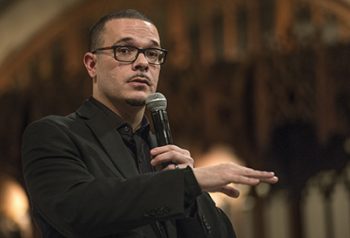The Smart Decarceration Initiative hosted its second national conference, “Tools and Tactics: Promising Solutions to Advance the Era of Smart Decarceration,” November 2-4 at the University of Chicago.

The conference opened with “A Conversation with Susan Burton,” featuring the formerly incarcerated founder of A New Way of Life, a national organization that helps former prisoners.
Other speakers included U.S. Sen. Richard J. “Dick” Durbin (D-Illinois); writer and activist Shaun King; Karol Mason, president of John Jay College of Criminal Justice and former U.S. assistant attorney general; Marc Mauer, executive director of The Sentencing Project; and Ronald Sullivan, professor and director of the Criminal Justice Institute at the Harvard Law School.

About 175 people attended the conference, and a crowd of nearly 1,300 turned out for King’s appearance, filling the pews at the university’s Rockefeller Chapel.
King laid out four guideposts for the path to victory in criminal justice reform. He also challenged the audience to rethink the current movement around police use of force and related justice issues, saying those who wish to enact meaningful and lasting change must add purpose, planning and resources to their passion.

‘It’s up to us’
Durbin encouraged attendees to continue to work with legislators toward reform, noting that bipartisan efforts are mounting all across the country. He described what led to an era of mass incarceration that is “unjust and fiscally unsound.”
“Most people believe in a world of second chances,” said Durbin, whose appearance drew television reporters to the conference. “Now it’s up to us.”
Sullivan emphasized the imperfect nature of criminal justice proceedings and the prevalence of wrongful convictions. He said he does not think justice reaches its greatest potential in an adversarial system of adjudication, where the focus is more on winning than on illuminating the truth.
“Justice does not just happen,” Sullivan said. “Each one of us had to make justice happen.”

Panel topics centered on decarceration-focused policy innovations, violence and criminal justice reform in Chicago, people most affected by incarceration, behavioral health inequities in the criminal justice system and organizing for decarceration. Moderators for each panel guided engaging discourse between the audience and panel members, weaving in their own expertise.

“What was so exciting about this conference is that it brought together people from so many disciplines and experiences with a shared commitment to the important work of decarceration,” said Matthew Epperson, co-director of the Smart Decarceration Initiative (SDI), based at the Center for Social Development. “That gives me hope.”
Social work in police work
During one panel, Jason Jones, an officer and coordinator of a crisis intervention team at the Portland, Oregon, Police Bureau, said that most police work is about handling relationships—in effect, social work. In Portland, he said, less than 2 percent of police-citizen interactions involve any use of force, but more than 90 percent of police training is in dealing with violence. He called for more engagement of social work in police training and partnerships.
Meeting Jones was “one of the most poignant moments” of the conference for Michael Gross, who was previously incarcerated and is an administrative assistant for SDI. “The discussions we had were heartfelt and emotionally raw, honest. He left an indelible impression on me.”
During breakout sessions, conference participants were able to dive deeper into various aspects of criminal justice reform in small groups. Each session was led by two subject matter experts who guided the conversation and posed questions and challenges to the group to foster actionable ideas that each participant could take back to their organizations.
Carrie Pettus-Davis, SDI co-director with Epperson, said the conference underscored three powerful themes: “The importance of reducing the overrepresentation of people of color and people in poverty in the criminal justice system, the need to thoughtfully address the impact of trauma on individuals, and that there is room for everyone to be involved in the smart decarceration movement.”
“Promote Smart Decarceration” is one of the national 12 Grand Challenges for Social Work. SDI’s inaugural conference was in September 2015 at Washington University in St. Louis.